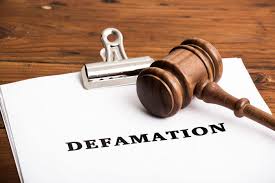
Defamation in political world
Defamation in political world
The word is broad and encompasses disparaging remarks, publications that are harmful, and actions that harm a person's reputation, notoriety, social standing, occupation, entity, or agency.
The act of spreading untrue information about someone that harms that person's reputation in the eyes of the general public is known as defamation. This includes any untrue statement that is published or spoken that is done so with the deliberate, intentional, and knowing intent to harm someone's reputation.
Using defamation as a political weapon comprises actions like the following:
• Public opinion-shaping: Politicians can influence public opinion in their favor by disseminating unfavorable information about their opponents. This works particularly well when dealing with sensitive or scandalous material.
• Discrediting opponents: Politicians can undermine the ideas and arguments of their opponents by harming their reputation. This may make it simpler to reject the policies and opinions of their rivals.
• Distracting attention: Politicians can employ defamation as a means of drawing attention away from their own transgressions or failings. They might deflect attention from their own scandals or policy failures by demonizing their opponents.
• Polarization: Defamation may be used to fortify support among one's constituency in highly divided political contexts. Politicians can incite an "us vs. them" mindset and mobilize their supporters by painting opponents as dishonest or unethical.
Laws pertaining to defamation:
- The IPC's Section 499 goes into detail on how defamation can occur through written or spoken words, signs, or visual representations.
- Section 500 provides that a person found guilty of criminal defamation faces up to two years in jail, with or without a fine.
- Defamation is defined in section 356 of the BNS, the new legislation that replaced the Indian criminal code, 1860, known as the Bharatiya Nyaya Sanhita.
- BNS section 356(2), which addresses slander, will now carry a two-year simple jail sentence, a fine, or both, in addition to community service.
- Citizens are granted the right to free expression under Article 19. Nonetheless, Article 19(2) has established a number of legitimate exceptions to this right, including those related to encouragement to commit crimes, contempt of court, and defamation.
Libel and slander are two comparable legal wrongs that together come to form defamation. Anytime a comment is published permanently, it will be considered a libel; conversely, slander refers to unrecorded spoken remarks, typically direct speech.
Because it has the ability to impact voters and affect public opinion, defamation in politics may be a potent weapon. But it's also immoral, and the people and organizations these assaults target might suffer grave repercussions. Defamation may cause harm to relationships, ruin reputations, and even result in legal action.
Parliamentary Privilege:
- Members of Parliament have particular immunity and are acknowledged for the significance that free expression plays in the constitution.
- Articles 105[1] and 194[2] of the Constitution, legislators in India have certain privileges. Chapter 16 of the Rajya Sabha rulebook and Rule 222 of the Lok Sabha rule book both regulate the aforementioned rights. Derogatory remarks or phrases spoken by members of parliament during sessions are not subject to legal action since they have an absolute privilege.
- There is no criminality associated with defamation on the House floor.
In a recent case titled Bharatiya Janata Party vs. Rizwan Arshad, the Karnataka High Court rejected a plea from the BJP to drop a defamation lawsuit brought by Indian National Congress Legislator Rizwan Arshad regarding allegedly defamatory tweets the party had posted about him. The court concluded that defamation cases can be brought against political parties.
Conclusion:
In conclusion, the purpose of defamation laws is to stop people from maliciously exercising their right to free speech and expression. It is appropriate that Indian law does not distinguish between slander and libel. Unless it is covered by parliamentary privileges, defamation in politics should be absolutely prohibited as it seriously damages public confidence in political parties.












comments